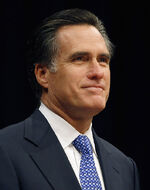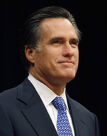In a crowded primary of several prominent Republicans eying the nomination, former Massachusetts Governor Mitt Romney was the early front runner. However, former Governor Tim Pawlenty won the Iowa Caucuses as he gained momentum in the months before the primaries were scheduled to begin. Jon Huntsman Jr. also emerged as a strong candidate with a win in the Nevada Primaries. Pawlenty ended up winning the nomination after winning most of the primaries against Jon Huntsman and Governor Mitt Romney. He then chose Freshman Marco Rubio of Florida to be his running mate, the first time that the Republicans nominated any non WASP for Vice President. One of the major issues in these primaries was Moderates vs. Tea Party.
Candidates[]
Nominee[]
- Tim Pawlenty - 1796 delegates
Dropped Out During Primaries[]
(listed in order of delegates, if no delegates, then votes)
- Mitt Romney - 191 delegates
- Jon Huntsman - 71 delegates
- Newt Gingrich - 11 delegates
- Herman Cain - 2 delegates
- Michele Bachmann
- Buddy Roemer
- Fred Karger
Dropped Out Prior to Primaries[]
(listed in order they dropped out)
- Ron Paul
- Peter Jones
- Rick Santorum
The Race[]
After the candidates all began to run, Romney rose to the top as the major candidate, with Gingrich, Pawlenty, and Trump fighting for second place. Surprisingly, Sarah Palin and Mike Huckabee chose to stay in the TV business and not run. Trump's campaign, however, was primarily a publicity stunt, and he dropped out within months. After he left the race, Ron Paul too dropped out because he thought that the Neo-Conservatives were too powerful. Haley Barbour, after tough racial questions and criticism due to his career as a lobbyist, dropped out soon later, as did Peter Jones, a totally unknown Gas Station owner of Georgia who had been running on a "I'm a normal guy" campaign. Jones would later win a seat in the Georgia state House.
Mitt Romney was a strong frontrunner, his victory all but certain due to superior name recognition, money, and organization. However, Romney's huge lead began to decrease, due to attacks by Gingrich and Pawlenty, who pointed out Romney's past liberal views, and stressed Romneycare. Rick Santorum ran religious themed adds to try and draw Protestants away from Romney; unfortunately for him, the resulting contreversy destroyed the Santorum'12 campaign. Herman Cain began to attract attention due to a series of very effective radio adds, as well as a huge grassroots campaign. Michele Bachmann, who had endorsed Santorum, made a surprise entry into the race in October. However, her late arrival hurt her, as she missed many debates and did not have a long time to plan out a campaign.

Pawlenty on the Campaign Trail
The Iowa Caucus resulted in a win for Tim Pawlenty with 25% of the vote. In second place came Newt Gingrich with 21%, Jon Huntsman came in a distant third place with 11% of the vote. Romney had chosen to concentrate on New Hampshire and Nevada and thus had barely campaigned in Iowa. After their embarrasing defeats, Buddy Roemer and Michele Bachmann all dropped out. New Hampshire was a totally different story. There, Mitt Romney gained a victory of 30%, followed by Jon Huntsman with 25% and Tim Pawlenty with 19%. Jimmy McMillan, after coming in second to last place, decided not to be a Republican any more.
The Nevada and South Carolina Primaries helped to narrow down the race. Nevada, gave Huntsman an 31% of the vote. He was followed by Romney, who achieved 30% of the remaining vote, with the rest being split fairly evenly between Pawlenty, Gingrich, and Cain. South Carolina gave Pawlenty a narrow 29% victory over Mitt Romney. Gingrich, after recieving only 11% of the vote because his numerous divorces and affairs drove away conservative voters, dropped out.
Cain eventually dropped out of the presidential race, and endorsed Tim Pawlenty. Despite Romney's success in New England and a smattering of other states, due to Santorum's religous adds the highly Christian South went for Pawlenty, as did Pawlenty's home midwest. After he lost the California Primary, Mitt Romney suspended his campaign to see if he still had a chance to win. He then endorsed Pawlenty.
Considering that his only remaining Challenger was Fred Karger, Pawlenty decided to concentrate on the national campaign. Karger, who had simply been trying to rise Gay Rights awareness, upon realising he would no longer be able to debate Pawlenty, decided to leave the race as well.
Vice Presidential Selection Process[]
Pawlenty was then faced with the choice of who to make the Vice-Presidential nominee for the Republican Party. Knowing that he needed to win the south, he considered Haley Barbour. Due to the fear that moderates may desert the party, Jon Huntsman was also considered. Rand Paul, on the other hand, was considered because of he was young, exciting, and Tea Party, as was Marco Rubio. In the end, Pawlenty chose Rubio in order to make the ticked more diverse and win the key state of Florida. Rubio was nominated almost unanimously by the delegates in the 2012 Republican convention, with only two dissenting delegates, one who voted for Herman Cain, and another who voted for Michele Bachmann.



















